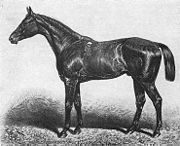Smith v Hughes
| Smith v Hughes | |
|---|---|
 |
|
| Court | Queen's Bench |
| Decided | 6 June 1871 |
| Citation(s) | (1870-71) LR 6 QB 597; [1861-73] All ER Rep 632; (1871) 19 WR 1059 |
| Case opinions | |
| Cockburn CJ, Blackburn J and Hannen J | |
| Keywords | |
| unilateral mistake, objectivity | |
Smith v Hughes (1871) LR 6 QB 597 is an English contract law case. In it, Blackburn J set out his classic statement of the objective interpretation of people's conduct when entering into a contract. Rejecting that one should merely look to what people subjectively intended, he said,
"If, whatever a man's real intention may be, he so conducts himself that a reasonable man would believe that he was assenting to the terms proposed by the other party, and that other party upon that belief enters into the contract with him, the man thus conducting himself would be equally bound as if he had intended to agree to the other party's terms."
Mr Hughes was a racehorse trainer. Mr Smith, who was a farmer, brought him (Mr. Hughes) a sample of oats, and Hughes ordered forty to fifty quarters of oats at 34 shillings a quarter. Sixteen quarters were sent to start with. But when they arrived, Hughes said they were not the oats he thought they were. He had apparently wanted old oats (which are the only ones racehorses can eat), and he was getting new, green oats. In fact, Smith's sample was of green oats. Hughes refused to pay and Smith sued for breach of contract, for the amount delivered and for damages for the amount for oats that were still to be delivered. Later questions were asked to jury.
The jury at the County Court of Surrey holden at Epsom, initially held for Mr Hughes that there was a mistake on his part, but were directed by the judge that if Mr Hughes was under a mistake about the oats (thinking they were old when they were green oats) and Mr Smith had known it, they should find in Mr Hughes' favour. Mr Smith appealed.
The Court of the Queen's Bench found that the jury had been misdirected and ordered a retrial. Leaning in Mr Smith's favour, they held that the question was not merely whether the parties were at consensus ad idem, but what they had communicated by their conduct and words to one another. Mr Smith was held to be under no duty to inform Mr Hughes of his possible mistake about the kind of oats, reaffirming the old idea of caveat emptor (buyer beware). A unilateral mistake is therefore in principle no ground for rescission of a contract. Cockburn CJ gave the first judgment.
I take the true rule to be, that where a specific article is offered for sale, without express warranty, or without circumstances from which the law will imply a warranty—as where, for instance, an article is ordered for a specific purpose—and the buyer has full opportunity of inspecting and forming his own judgment, if he chooses to act on his own judgment, the rule caveat emptor applies. If he gets the article he contracted to buy, and that article corresponds with what it was sold as, he gets all he is entitled to, and is bound by the contract. Here the defendant agreed to buy a specific parcel of oats. The oats were what they were sold as, namely, good oats according to the sample. The buyer persuaded himself they were old oats, when they were not so; but the seller neither said nor did anything to contribute to his deception. He has himself to blame. The question is not what a man of scrupulous morality or nice honour would do under such circumstances. The case put of the purchase of an estate, in which there is a mine under the surface, but the fact is unknown to the seller, is one in which a man of tender conscience or high honour would be unwilling to take advantage of the ignorance of the seller; but there can be no doubt that the contract for the sale of the estate would be binding.
...
Wikipedia
